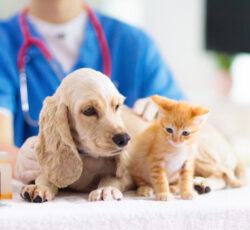Do Dogs and Cats Get Different Vaccines?
 As pet owners, we want to do everything we can to keep our furry friends healthy and protected. One essential aspect of pet care is vaccinations. They play a crucial role in preventing and controlling diseases in dogs and cats. However, many pet owners wonder if dogs and cats require different vaccines. In this blog post, we will explore whether dogs and cats get different vaccines and the importance of vaccinating your pets.
As pet owners, we want to do everything we can to keep our furry friends healthy and protected. One essential aspect of pet care is vaccinations. They play a crucial role in preventing and controlling diseases in dogs and cats. However, many pet owners wonder if dogs and cats require different vaccines. In this blog post, we will explore whether dogs and cats get different vaccines and the importance of vaccinating your pets.
Understanding Canine Vaccines:
Dogs require a specific set of vaccines to protect them against various diseases. Some of the core vaccines for dogs include:
1. Rabies Vaccine:
The rabies vaccine is mandatory for all dogs in most countries as it is a fatal disease that can be transmitted to humans. It is typically given as a one-year or three-year vaccine.
2. Distemper Vaccine:
The distemper vaccine protects dogs against a highly contagious viral infection that can lead to neurological problems and respiratory issues. It is usually given as a combination vaccine that includes protection against other diseases like parvovirus and adenovirus.
3. Parvovirus Vaccine:
The parvovirus vaccine is essential as it protects dogs from a highly contagious and potentially deadly disease that affects the gastrointestinal tract. It is crucial, especially for puppies, as they are more susceptible to this virus.
4. Adenovirus Vaccine:
The adenovirus vaccine protects dogs against a viral infection that can cause liver and respiratory problems. It is commonly administered along with the distemper vaccine.
Understanding Feline Vaccines:
Cats have their specific set of vaccines to protect them from various diseases. Some of the core vaccines for cats include:
1. Rabies Vaccine:
Similar to dogs, cats also require the rabies vaccine as it is a zoonotic disease that can be transmitted to humans. It is typically given as a one-year or three-year vaccine.
2. Feline Distemper Vaccine:
The feline distemper vaccine, also known as the FVRCP vaccine, protects cats against several viral infections, including feline viral rhinotracheitis, calicivirus, and panleukopenia. These diseases can cause upper respiratory infections, oral ulcers, and gastrointestinal problems.
3. Feline Leukemia Virus (FeLV) Vaccine:
The FeLV vaccine is recommended for cats that go outdoors or in multi-cat households. FeLV is a viral infection that weakens the immune system and can lead to cancer or other severe health issues.
4. Feline Immunodeficiency Virus (FIV) Vaccine:
The FIV vaccine is available for cats at risk of exposure to FIV-positive cats. FIV is similar to the human immunodeficiency virus (HIV) and weakens the cat’s immune system.
Conclusion:
Vaccinations are essential for the health and well-being of your dogs and cats. While there are differences in the specific vaccines required for dogs and cats, both need core vaccines to protect them from common diseases. Working with a trusted veterinary clinic, such as Williamsburg Small Animal Hospital, ensures that your pets receive the necessary vaccines and quality care. Remember, regularly vaccinating your dogs and cats not only protects them but also prevents the spread of diseases to other animals and humans.
Work With Williamsburg Small Animal Hospital:
When it comes to keeping your dogs and cats up-to-date on their vaccines, it is crucial to work with a reliable veterinary clinic. Williamsburg Small Animal Hospital is an excellent option for all your pet’s vaccination and small pet needs. We understand the importance of vaccinations in preventing diseases and will guide you through the vaccination schedule for your dog or cat. In addition to vaccines, we also offer a wide range of veterinary services for your pets, including wellness exams, dental care, surgical procedures, and diagnostics. Our team is committed to providing top-notch care to keep your pets healthy and happy. Contact us today to learn more about what we can do for you!
